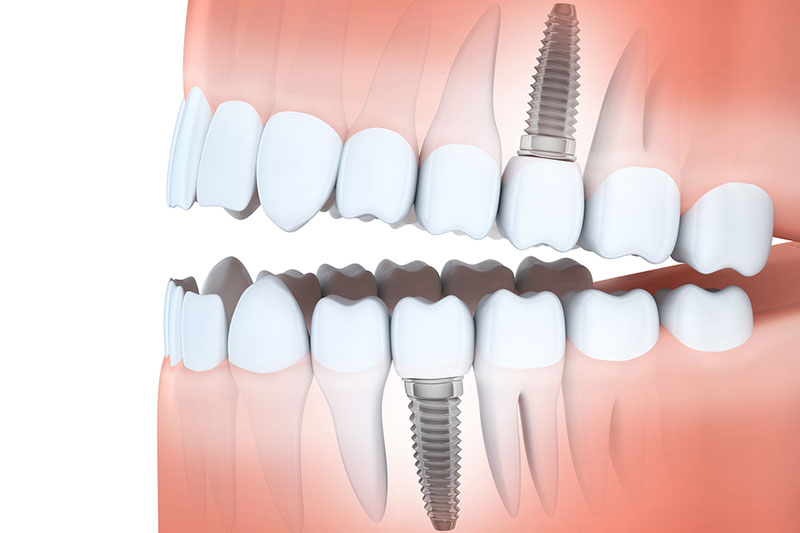
In the past, patients who had experienced tooth loss had to settle for an incomplete replacement tooth that consisted of only a prosthetic crown (or crowns) and no root-like structures. Dental implants represent a significant improvement in dental technology for restoring the smile after tooth loss.
Replacing both the root and crown of missing teeth, dental implants offer tremendous benefits to patients who are eligible for this treatment.
To learn more about this innovative treatment option and set up an evaluation to determine whether it would meet your needs, call our office and speak to one of our friendly staff members.
What are dental implants?
Dental implants are small titanium screws that are surgically inserted into a patient’s jaw to replace the roots of missing teeth. Because dental implants are made of titanium, which is biocompatible, the bone tissue in the jaw will fuse with the implant over the course of several months.
That process, known as osseointegration, renders the dental implant a fixture in the patient’s jaw. As a result, dental implants can be used to support a single crown, a dental bridge or even a complete denture, making this treatment feasible in various tooth loss scenarios.
What are the benefits of dental implants?
Because dental implants mimic the roots of biological teeth, they are able to perform functions similar to those taken on by the roots of your natural teeth.
The benefits of dental implants include:
Durability: Dental implants prevent jawbone atrophy, so implant-supported restorations have greater longevity than conventional appliances.
Security: The bond between implant and bone is strong, making dental implants highly effective at securing an appliance.
Convenience: Patients who choose dental implants eliminate the need for messy denture adhesives or fixed appliances that restrict access to the gumline and require alterations of oral hygiene habits.
Comfort: Dental implants feel like your biological teeth, so they are the most comfortable tooth replacement available.
Preserved function: The bond between bone and implant facilitates the implant’s ability to withstand strong forces needed for chewing.
Am I a good candidate for dental implants?
The quality of bone at the implant site is essential to long-term dental implant success, so the oral surgeon will thoroughly assess the integrity of that bone before developing the treatment plan.
Placing a dental implant at a site with significant bone loss could put the patient at risk for premature implant failure. However, our specialists can use certain techniques to maximize the available bone to support osseointegration.
In some cases, a preliminary bone graft may be needed to supplement the bone tissue at the site.
Additionally, patients must be in good health overall to tolerate the surgical procedure needed for implant placement. Your surgeon will review your medical history with you to identify any potential complications.
What should I expect from dental implant placement?
Most dental implant placement occurs in two phases: placement of the implant within the jawbone and placement of the abutment. The latter phase occurs after osseointegration is complete and precedes placement with the restoration.
To prepare for dental implant placement, we will anesthetize the site and sedate the patient, if desired, for maximum comfort. Then the oral surgeon makes a small incision in the gum and creates a small hole in the jaw to insert the implant.
The implant is then sutured into place, and the patient is monitored periodically for several months as osseointegration proceeds. When osseointegration is complete, the patient returns to have the abutment placed and to have impressions made to design the restoration.
FAQs about Dental Implants
Dental implant placement shouldn’t involve much more discomfort than other types of oral surgery, such as surgical extractions. During the procedure, our team will do everything possible to maximize your comfort, including providing local anesthesia and sedation. As those anesthetics wear off after the surgery, you’ll likely experience some mild discomfort, as you would after any surgical procedure. This symptom can often be managed with over-the-counter painkillers.
The recovery process following dental implants takes several months in its entirety. That is the amount of time that is normally needed for the dental implant to be fully osseointegrated. However, patients can resume many aspects of their normal routines within a few days of the implant placement. It may be necessary to adjust your diet or activity levels for a longer time, however. Consult with your oral surgeon to see what the expectations are in your case.
Dental implants have a structure that is quite similar to biological teeth, so most patients find that their dental implants actually feel like their biological teeth.
The cost of dental implants will vary from patient to patient. Our office staff will work closely with you to maximize any insurance coverage that you may have for this treatment. In order to streamline this process, we ask that you submit your new patient paperwork, including your insurance information, a few days in advance of your first appointment. This gives our staff the opportunity to get a head start on verifying your insurance benefits.
